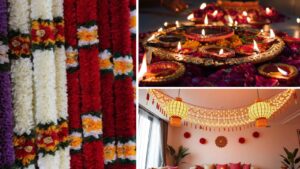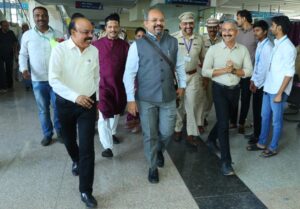Karva Chauth 2024: Date, Time, and Fasting Details for This Year’s Celebration

Karva Chauth 2024: Date, Time, and Fasting Details for This Year's Celebration
Karva Chauth, a festival cherished by married women across India, falls on October 20, 2024, symbolizing love, sacrifice and the sanctity of marriage.
Karva Chauth, one of the most awaited festivals for married women in North India, will be celebrated on Sunday, October 20, 2024. This auspicious occasion falls on the fourth day after the full moon (Purnima) in the Hindu month of Kartik according to the Purnimant calendar. In regions like Gujarat, Maharashtra and southern India, where the Amanta calendar is followed, Karva Chauth occurs in the month of Ashwin. Despite these regional differences, the festival is celebrated on the same day across the country.
KARWA CHAUTH 2024: DATE AND TIMINGS
• Date: Sunday, October 20, 2024
• Moonrise Time: 7:54 PM (may vary depending on the location)
• Karwa Chauth Puja Muhurat: 06:23 PM to 07:45 PM (duration: 01 hour 21 minutes)
• Karwa Chauth Upavasa Time: 07:56 AM to 07:39 PM (duration: 11 hours 43 minutes)
• Chaturthi Tithi Begins: at 03:16 AM on October 20, 2024
• Chaturthi Tithi Ends: 12:46 AM on October 21, 2024
Karva Chauth is a unique and significant fasting ritual observed by married women for the long life, prosperity and well-being of their husbands. Women undertake a strict fast, abstaining from food and water from sunrise until the moon appears in the night sky, a practice known as nirjala Vrat, signifying their dedication and love.
Key Points
• Married women observe a strict fast from sunrise to moonrise, without taking any food or water.
• They worship Lord Shiva and His family, including Lord Ganesha.
• The fast is broken only after sighting and making offerings to the moon.
• The festival is also known as Karak Chaturthi, and Karwa or Karak refers to the earthen pot through which water offerings are made to the moon
Rituals and Traditions
The day of Karva Chauth is not only a fasting occasion but also one filled with cultural and religious significance. Married women worship Lord Shiva, Goddess Parvati, Lord Ganesha, and Lord Kartikeya during the evening Puja, seeking their blessings for their husband’s longevity. The festival also coincides with Sankashti Chaturthi, a day dedicated to Lord Ganesha, amplifying the spiritual fervor of the day.
The festival’s name, “Karva” or “Karak,” refers to the earthen pot used during the Puja. This pot is crucial in the evening ritual, where water offerings, known as Argha, are made to the moon. After the Puja, the Karva is offered as charity to a Brahmin or another eligible woman, symbolizing the wife’s devotion and sacrifice.
The day starts early with women consuming a pre-dawn meal called Sargi, traditionally prepared and gifted by the mother-in-law. This meal typically includes fruits, sweets, and savory items to help sustain the rigorous fast. After, Sargi, the women abstain from food and water for the entire day.
In the evening, the fasting women adorn themselves in vibrant traditional attire, often in shades of red, symbolizing marital bliss. They gather with other married women, sitting in a circle to perform the Puja and exchange folk songs, stories, and blessings related to Karva Chauth.
Regional and Cultural Significance
While Karva Chauth is especially popular in North Indian states like Punjab, Haryana, Uttar Pradesh and Rajasthan, the essence of the festival is shared across India. It emphasizes devotion, love, and the deep bond of marriage, values that are held dear by communities everywhere.
Four days after Karva Chauth, Ahoi Ashtami is observed, where mothers pray for the long life of their sons. Together, these festivals highlight the strong family values central to Indian culture.
Breaking the Fast
The fast is concluded only after the moon is sighted. Women view the moon through a sieve, followed by a symbolic gaze at their husband’s face through the same sieve. This beautiful ritual signifies that the husband is the wife’s universe, and she prays for his longevity. The husband then offers his wife the first sip of water and a morsel of food, marking the end of the fast and symbolizing their mutual love and dedication.
Karva Chauth is not merely a fasting ritual but a celebration of the sacred marital bond. It continues to be a cherished festival across generations, celebrated with great joy and reverence. As you prepare for Karva Chauth 2024, may the divine blessings of Goddess Parvati and Lord Shiva bring happiness, prosperity, and health to your married life.











